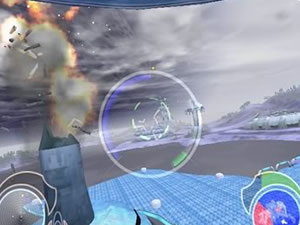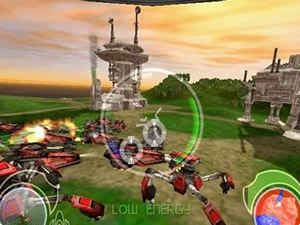Aquila Sunrise.
Having reviewed several helicopter games in the past, I’m used to disappointment.
I always expect fast-paced, high-intensity action, but recent
helicopter games either deliver a plodding sim-type experience or an arcade-style
shoot ’em up. Chopper games rarely get the balance right, and I never suspected
it might have something to do with the intrinsic nature of helicopters. Until
now.
Having played Infogrames’ Battle Engine Aquila, I can confidently tell
you the problem with helicopters is that they aren’t gigantic tanks that can
morph into jets.
You
may be wondering why I even brought up the whole helicopter thing in the first
place. The reason is that Aquila shares much of its design with common
chopper games: you are part of a strike force or part of a defensive measure,
escort, etc. and you must help win the battle, deliver the Admiral to safety,
etc. Except this time, you’re in a huge, wicked cool mech tank that can cut
a fiery swath of destruction through enemy forces on the ground, or turn into
a mecha-jet and rain some neo-Genesis wrath on the heads of your newly unrepentant
enemies.
The story seems cookie-cutter at first. You’re a punk kid, cargo-mech jockey
named Hawk, who miraculously gets conscripted by Forsetti forces to pilot their
extra secret, hush-hush battle engine. You join a squad of l33t fighter
pilots under the command of some skeptical, crotchety general type, who, naturally,
thinks you’re about as cool as stepping in gum.
Thankfully, the story starts moving and actually develops through cutscenes
between each mission. These scenes aren’t Metal
Gear quality, but they’re substantial, and it’s obvious that the developers
put a lot of time and effort into them. They didn’t have to, but they did, and
that’s what makes a game good.
On top of the briefings, should you choose to ignore them, you’ll receive
in-game transmissions from your forces telling you what you should be doing
and what’s going wrong. These transmissions are audible, too, so you don’t have
to look away from the action to receive your orders.
The missions themselves typically involve defending your base, escorting cargo, or assaulting the enemy. Your objectives are usually straightforward (kill everything, don’t let your stuff get killed), but can occasionally be frustrating. Some of your structures are highly vulnerable, your tank armies don’t seem very tough, and your friends sit there and yell at you while they’re dying (what jerks). But otherwise, each mission is sweet. Some take place in the midst of some colossal battle, while others occur on the open ocean (which is treacherous, as Aquila can’t swim).
The gameplay in Aquila is like a glass of water after a friend’s 21st
birthday party: clear, crisp, clean and refreshing. A short tutorial covers
all the control dynamics (except for changing weapons, which is sort of annoying),
which are very easy to grasp.
In tank mode, the left analog stick moves you forward, backward and strafing,
while the right stick aims and steers. One of the shoulder buttons changes weapons
while another fires. By quickly tapping the left stick left to right or back
to front, you can make your Aquila hop around, a means of avoiding enemy fire.
Regardless of the fact that there’s frequently too much enemy fire to dodge,
I still appreciate this gesture.
You can also turn into a jet at the touch of a button. As the jet you fly at a constant speed and can’t strafe, both of which would seem to be major annoyances. However, it seems as though these options were left out to streamline the controls and make everything more straightforward.
Your mech has an energy gauge within its targeting reticule; when your energy
runs out, you can’t fly anymore and therefore plummet to the ground. And sometimes
explode. Very embarrassing. However, if you pay attention to the gauge, you
can land and maybe not explode. Unless you get shot, but that’s a horse of a
different color.
Speaking of getting shot, there’s all kinds of shooting in Aquila.
Not only can you choose between mech-pilots – each of which has different advantages
and disadvantages against the enemy types (air, ground, infantry) – but you
can also choose different weapon packages for your mechs. Included in these
packages are Vulcan Cannons, a charging plasma laser, an energy beam, rockets,
grenades, micro-missiles and a few others. Except for the Vulcan Cannons, all
of the weapons are very destructive.
 Part
Part
of this is due to the effective targeting reticule. Since most of the weapons
have some lock-on capabilities, a good targeting system is a must, and Aquila
doesn’t disappoint. The reticule is very intuitive (some enemies must be led
to be properly targeted) and can target multiple enemies. However, the ability
to choose different targeting spreads (like changing the choke on a shotgun)
for the micro-missiles would have been really nice.
Graphically, Aquila is adequate. It doesn’t necessarily push the limits,
but rather effectively works within the limits to the point that it’s almost
easy not to notice just how innovative this game is. For example, faraway ships
that would otherwise be a rendering nightmare are instead represented as looming
shadows. The effect is realistic and enhances the player’s perception of distance.
The explosions are also satisfying, as huge flying fortresses erupt into fiery
chaos and slowly plummet to the earth. However, there are several textures that
look very run of the mill (like the water), and none of the explosions themselves
are particularly impressive.
Having said that, the framerate is sweet with nary a slowdown, despite the swarms of tanks and planes and bombers, all shooting at your base which is exploding, and you’re firing missiles at this and, yeah, it never slows down. Rock.
The virtual chaos is effectively translated into cacophonous sound, as exploding ships thunder, comrades lament the destruction of the base and grenades pummel the enemy ranks. Such an aural and visual synthesis of insanity facilitates white-knuckled gameplay, not to mention the emphatic “Phew!” at the end of each mission.
You can also challenge a friend to a skirmish or fight cooperatively through
three levels, which clearly isn’t enough. But since Battle Engine is
so accessible, friends can pick this game up in a few minutes, even if they
aren’t regular gamers.
Overall, Battle Engine Aquila is a surprisingly solid game. The numerous
missions are hard, but not impossible (they actually branch if you get a high
enough ranking). In a genre full of stinkers and throwaways, the care the developers
put into making this game special is notable. While it won’t change your life,
it’s a suitable distraction.

-
Fast and Frenetic
-
Fun
-
Smooth framerate
-
Unreasonable mission objectives
-
Not particularly deep
-
Not enough multiplayer







